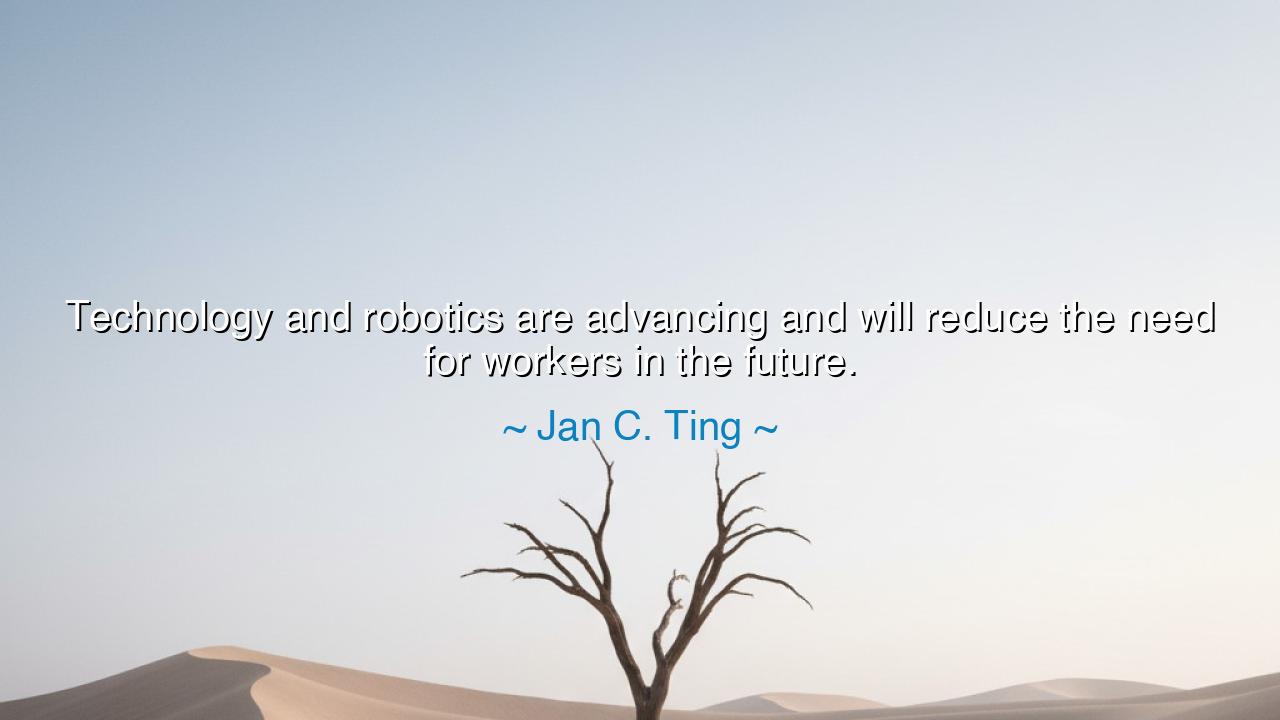
Technology and robotics are advancing and will reduce the need
Technology and robotics are advancing and will reduce the need for workers in the future.






"Technology and robotics are advancing and will reduce the need for workers in the future." These words, spoken by Jan C. Ting, carry with them a profound forewarning. They remind us of the steady march of progress—how, through the power of human innovation, we have transformed our world in ways both miraculous and daunting. The advances in technology and the rise of robotics are changing the very nature of labor, just as the Industrial Revolution did centuries ago. Machines, once the humble tools of human hands, have now become the hands themselves, taking over tasks once thought the exclusive domain of mankind. And with this power comes a question that reverberates through the ages: What does the future hold for those who labor?
There is wisdom in reflecting on the ancient world, where labor was the foundation upon which civilizations were built. From the great Egyptian pyramids, erected by the hands of tens of thousands, to the Roman legions who forged empires through sheer human effort, work was revered as both a noble pursuit and a necessary function of society. Yet even then, there were whispers of change. The plow, once drawn by oxen, was replaced by machines that allowed for greater harvests with less human toil. The printing press replaced the labor of hand-copying texts, and in time, factories took over the work of artisans and craftsmen. The message was clear: progress brings both opportunity and uncertainty.
Jan C. Ting's words echo a truth that is not new: technology, in its relentless advance, reshapes the world. But now, unlike in previous ages, the question is not just about replacing physical labor—robots are now entering domains of thought, decision-making, and even creativity. What was once the purview of the human mind—engineering, writing, and artistry—is now being taken up by machines programmed to learn and adapt. This rapid transformation presents us with a dilemma: if machines can think, learn, and act with increasing efficiency, what will become of the human worker? Will the laborer of the future be replaced entirely by robots?
Consider the tale of Henry Ford, whose assembly line revolutionized manufacturing. In his time, this new technology did not so much eliminate workers as it redefined their roles, pushing them to new heights of specialization and efficiency. However, Ford's innovations also sparked fears—fears that technology would reduce the number of workers and make labor more dehumanized. Today, as we stand on the precipice of yet another technological revolution, those fears have grown into a widespread concern: machines are taking the jobs of humans. But are they not also giving us a choice—the choice to redefine work and to elevate the human spirit beyond the menial tasks that once defined it?
The lesson is not one of despair, but one of opportunity. Technology and robotics may reduce the need for workers in traditional roles, but they also offer the chance for humankind to evolve. The greatest civilizations in history did not fall because of advances in technology, but because they failed to adapt. The ancient Greeks, in their search for wisdom and understanding, redefined the role of humans in society. The Renaissance reimagined the world of work, propelling mankind into new realms of art, science, and philosophy. In each age, the rise of machines did not bring the end of man, but the birth of new ideas, new roles, and new purposes.
Jan C. Ting's warning is not a call to fear but a call to action. We must look toward the future and understand that the world of labor is evolving. If the machines are taking the work, then it is time for us to find new work—work that is defined not by routine and repetition but by creativity, innovation, and human connection. Just as the workers of the Industrial Revolution embraced new technologies and adapted their skills, so too must we rise to meet the challenge of the digital age. Technology is not our enemy; it is the tool that will allow us to transcend the limitations of the past and build a future where human potential is freed from the chains of monotonous labor.
The practical lesson is clear: embrace technology and use it to your advantage. Learn new skills that will position you in the emerging industries of tomorrow—whether it be in artificial intelligence, robotics, or even the creative fields where human ingenuity cannot be easily replicated by machines. Adaptability, resilience, and lifelong learning will be the virtues that guide you through the challenges of the future. The machines will not define us; we will define ourselves by how we use them, how we evolve, and how we ensure that human labor continues to contribute meaningfully to the world we leave behind for future generations.






AAdministratorAdministrator
Welcome, honored guests. Please leave a comment, we will respond soon